The Organization of Power
Part 3
Ideas for change over time reveal themselves to be part of a strategic plan
at the point of fruition - the point when the plan is well-formed enough to be
able to see the elements in a forward and backward direction. In other
words, we see how we got here and we can see where we are going. In the
United States, we are headed for a system of government management of
everything. It is a fascist-designed system to maximize profits by
shifting costs to others - especially the taxpayers. In political terms,
it is a fascist system - merger of corporate and government power. In
economic terms, it is communism.
The communist system of management is most apparent in the recent government
takeover of the health insurance business through the clever conceptualization
of the word "market". Obama Care is styled as a "market-based" system but
what that really means is computer-based IT Management System and that system
manages all entities involved in the business of health care - consumers and
providers alike.
The government takeover of the health care business is just one indicator of
the move to a communist system of management. There is another, less
obvious indicator right in your own local area. Fortunately, there is one
person whose activities, upon examination, reveal the communist management
systems. His name is Doug Henton and he is CEO of a consulting firm called
Collaborative Economics (big hint for you in the name).
Doug Henton is on the
Advisory Board of
The
Alliance for Regional Stewardship. The Alliance is an affiliate
organization of the executives of the Chamber of Commerce.
Regional Stewards are the fascist participants in the network of soviets
(committees and commissions) that establish themselves - in "partnership" with
your local elected officials to manage the economy and resources of your region.
Notice I didn't say state, county or city. This is because a region is an
area that crosses legal, jurisdictional boundaries. In simple terms, it
is a gray area in terms of our traditional legal structure and because of that,
regional rule-making can only be done by gentleman's agreement, the
"partnership", which gives space for the communist soviets to work outside of
the system to manage the inside of the system. Quite simply, it is
collusion and racketeering between elected officials and business leaders in a
community with bribe money coming from the federal government in the form of
grants given to the soviet commissars - the so-called Stewards.
Excerpts from the page with the
History of the Alliance for Regional Stewardship:
While everyone has been impacted by the
economic crisis, some regions are feeling the brunt of the
storm while others are weathering through. Just as severity
of the crisis is being felt unequally, so to will growth
will return unequally. The regions that are best aligned to
tackle major issues such as transportation, education, land
use planning and workforce will emerge faster and grow
stronger. ARS wants to help ensure your community is
poised for a return to prosperity.
The ARS Network is for proven and
aspiring regional leaders who recognize that economic
competitiveness, a sustainable quality of life, and strong
communities are all connected. ARS supports these leaders
and their efforts by helping them learn about effective
practices from other regions, develop their own civic
leadership skills, and design and carry out strategies for
breakthrough results.
Our History
In May 2000, 50 leaders from regions
around the US gathered in Kohler, Wisconsin to explore
the
creation of a national network that would support regional
initiatives and regional results.
A principal inspiration for the creation of the Alliance was
the life and legacy of John W. Gardner, former HEW
Secretary, founder of Common Cause and civic leader
and author for more than five decades. In a tribute to
Gardner on his death in 2002, national columnist Neal Peirce
noted Gardner's interest in regional organizing and
initiatives, writing: "Gardner saw limits both in federal
power and local activism.
He became intrigued with
metropolitan regions as the arena in which critical
collaborations--for the economy, environment, social
issues--must be forged, through expanded networks of
responsibility.''
Gardner had a clear vision for
the future of metropolitan leadership. To succeed,
regional efforts
Launched on the tide of Gardner's life and
inspiration, in its first six years the Alliance achieved notable success in
helping regional leaders drive regional solutions. With seed funding
from several national foundations, including Packard, Heinz, and MacArthur,
the Alliance has brought together more than 1,500 regional leaders in 13
National Forums, published 11 monographs on subjects ranging from achieving
regional equity to strengthening regional governance, developed new
platforms of web-based networking for regional leaders, and provided
consulting and advice to initiatives and civic campaigns in 16 regions
across the country.
John W. Gardner was the architect of the Great Society
programs of the 1960s. After Kennedy was assassinated and
LBJ became the president, LBJ appointed Gardner as the Secretary
of Health, Education and Welfare. The odd thing about it
was that Gardner was allegedly a Republican.
Interestingly, he was given a Presidential Medal of Freedom in
1964 by LBJ.
In the description above, a columnist named Neil Pierce was mentioned.
Neil Pierce is Chairman and
Founder of a group called The Citistates
Group. In their description, it says the following (emphasis
added):
Citistate is the name Neal Peirce
and Curtis Johnson coined in 1993 to describe how
metropolitan regions have begun to operate in the late
20th century.A
citistate isn’t defined by political boundaries.
Instead, it’s organic. A citistate is reality — a labor
market, a commute-shed, a broadcast area, the
circulation area of the lead newspaper. A citistate is
what the economy does.
Citistates would have made little sense under the old
paradigm of American thinking — “ federal, state,
local.” But they emerge as the centerpiece of a new
paradigm — “global, regional, and neighborhood.”
Citistates have become the focus of how our world is now
organizing itself.
...As economic actors, major U.S. citistates compete in
size with major world nations. In gross product, the New
York region ranks 13th among the world’s top economies,
just ahead of Australia, Argentina and Russia. The Los
Angeles citistate is bigger than Korea, Chicago greater
than Taiwan or Switzerland, Washington ahead of Hong
Kong, while Minneapolis-St. Paul exceeds Israel. And
according to figures compiled by Standard & Poor’s DRI
division for the US Conference of Mayors and National
Association of Counties, the US’s 314 metro regions
are clearly the economic drivers, providing 84 percent
of new jobs, 95 percent of high-tech jobs, 88 percent of
the country’s income.
Citistates’ importance was
enlarged by the rapid flowering of the Internet and the
digital revolution, together with the dramatic rise in
global commerce. The challenge of the 21st century is to
harness such forces, and civic will, for strategic
regional planning. Because to compete in the emerging
global economy, citistates have no choice:
to prosper they
must mobilize all their skills to protect their center
cities, grow smarter, protect their air and water,
achieve more social equity, and train their workforce to
excel in an increasingly competitive world marketplace.
It would be easy to dismiss Neil Pierce as a lunatic except for the fact of an
international conference of Mayors that was held in Lyon, France. I first
reported it on this webpage on
International Cities about 7 years ago.
| |
 |
 |
Aspen Transatlantic Mayors
Summit April 6-8
In cooperation with the U.S. Embassies in
Berlin and Paris, the
Aspen
Institute France, the Aspen Institute
Berlin and the U.S. Conference of
Mayors held a conference on "Smart Growth -
Problems of Urban Development in the 21st
Century." Mayors from the U.S.,
Germany and France met for three days in
Lyon France to discuss how globalization
affects urban development. The summit also
included experts on urban planning and development
from international organizations, research
institutions, and think tanks.
The mayors agreed that their own role is changing
as a result of globalization. They
are no
longer the traditional city planners of the past
100 years, but rather ombudsmen and innovative
leaders of important communities and regions.
Mayors can no longer afford to deal only with
local stakeholders. They conduct their own foreign
policy in an environment that sets local issues on
the agenda of local politics. Ambassador
John Kornblum strongly encouraged mayors to ignore
the admonishments of foreign ministries not to
engage in foreign affairs. For the good of their
citizens, mayors will increasingly enter the
international arena and become global players. The
network resulting from the Aspen
Transatlantic Summit series provides a forum for a
sustainable international dialogue among mayors to
discuss common challenges, exchange best
practices, and promote international
understanding.
The issue which generated the most intense
discussion was the question of how to
successfully assimilate immigrants and minorities
into existing communities.
What is
the recipe for a multicultural society? All
present agreed that this was one of the most
important issues facing them today and in the
future, and that this topic should be the focus
for the next summit meeting in Berlin in 2001.
Aspen Institute Berlin has begun coordination for
the second volume in the three-part series, which
takes place under the umbrella of the
New
Traditions Network
(READ IT).
Founding Partners of the
New Traditions Network
* * * * *
Lyon, France: Webb Opens First Transatlantic Summit
of Mayors
"The Twenty-First Century will
be the Century of Cities," Conference President Emphasizes
"If the nineteenth century was the century of
empires and the
twentieth century the century of
nation states, then the twenty-first century will
be the century of cities," said Conference
President and Denver Mayor Wellington E. Webb,
opening the historic first Transatlantic Summit of
Mayors in
Lyon, France, April 6-8.
The
Summit, created by Ambassador Felix G. Rohatyn, U.
S. Ambassador to France, and J. Thomas
Cochran, Conference of Mayors Executive Director,
brought about thirty German, French,
and U.S.
Mayors together to discuss key issues of
globalization
and their impact on the world's
cities. In Mayor Webb's words, "The century we
have just entered will be the century of cities,
reflecting
a renewed faith in cities and a
rediscovery of the vitality and richness that has
long characterized our great urban centers.
"We are facing a new era, owing in large measure
to a remarkable confluence of events as the forces
of commerce, culture,
technology, and political
reconciliation create unprecedented opportunity
for all our citizens," Mayor Webb said.
"Our
cities will
be both the heart and soul of this
historic and global transformation." And
"globalization gives us new opportunities for
partnership," he stressed.
U.S.
Delegation Members
In addition to Mayor Webb, the U.S.
delegation included Mayors
Victor H.
Ashe of Knoxville, past President of the
Conference of Mayors;
H. Brent Coles of Boise,
Conference Vice President;
James A.
Garner of Hempstead, Conference Trustee;
Clarence Harmon of
St. Louis; David W. Moore of
Beaumont; Marc H.
Morial of
New Orleans, Chair, Advisory
Board, Conference of
Mayors; Donald L. Plusquellic of
Akron; Susan Savage of
Tulsa; Sharon Sayles Belton of
Minneapolis; and J. Thomas
Cochran, Executive Director of the
Conference of Mayors.
Knoxville Mayor
Victor Ashe underscored
the theme of interdependence:
"I have been struck today," he
said, "by the
fact that if we
remove our language
differences, we see that the
issues we mayors face in
common go across both
continents and across all
counties. Mayor Ashe pointed
out the power and
potential of
the Internet: "The Internet
will change society,"
he
noted. The issue is "how to
harness changes brought about
by the Internet and make it
serve people." Mayor Ashe also
noted
that it is much cheaper
for him to fly to
Europe than to
San
Francisco or to
Seattle.
New Orleans Mayor Marc
Morial:
"You
Can't Be a Mayor Today
Without Having Your Own
Foreign Policy".
|
|
 |
 |
|
|
Just to recap how all of this fits together:
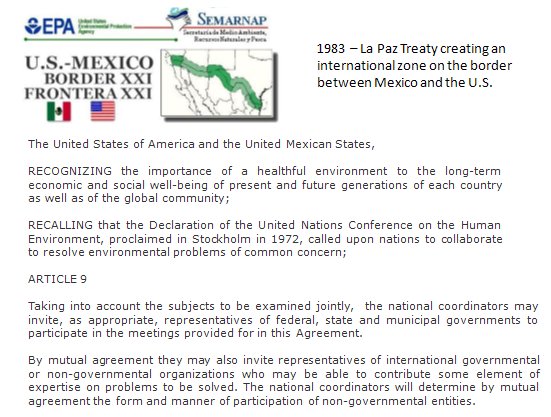
Secretary of State
George Shultz, Professor Emeritus at Stanford "the Farm"
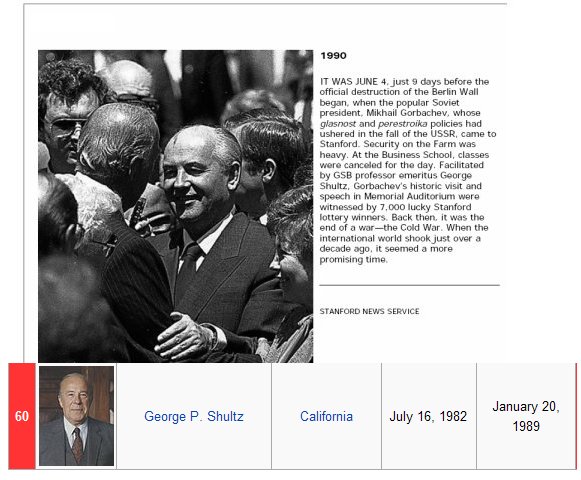
Global to Local
Subversion Strategy
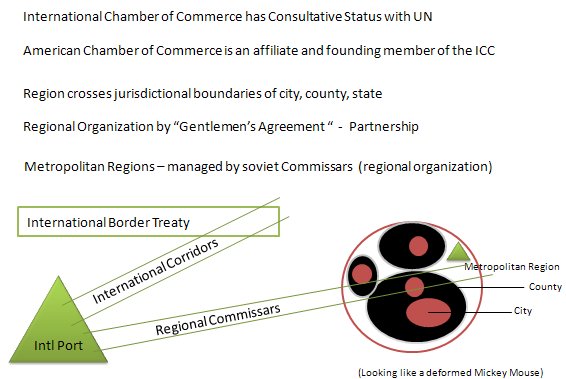
Regional Development
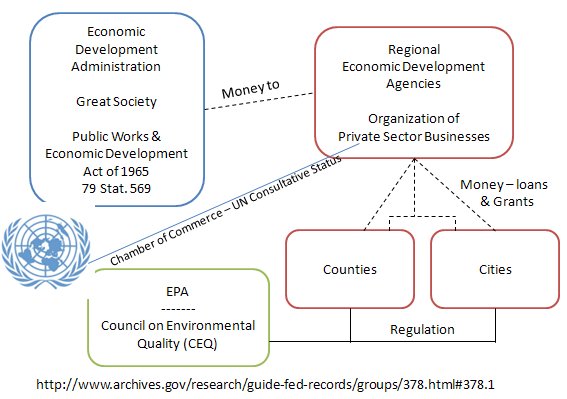
Boise
Valley Economic Partnership
2010 - Regional Soviet of Commissars -
aka Fascists
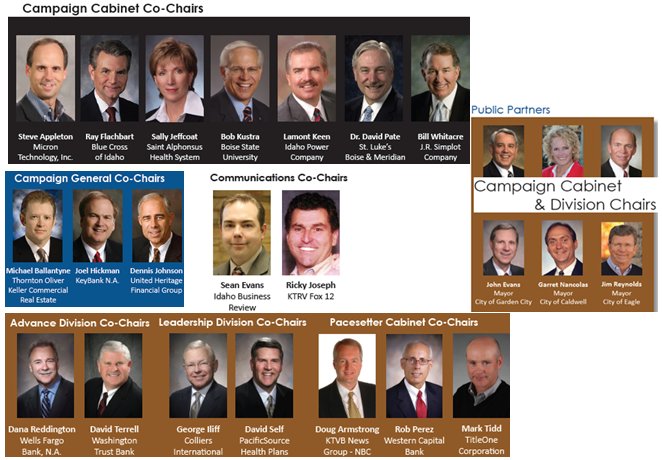
Where ever you are living in the United States, you'll
find this organization of power - the fascist soviet operating in the
background. This is the Communist method of organization and means of
exercising power and control. They've designed an economic system that
serves only their interests - the interests of business and their network.
The reason they've been able to carry out their
subversion of our government this far along is because they operate in the gray
area between federal and state law, between state and county/city law and
statutes. Our local Sheriffs and police departments focus on crime -
felony and petty. The FBI focuses on white collar crime. There are
no law enforcement agencies - nor any intelligence agencies that focus on
protection of our political system.
You might want to have some red T-Shirts made up that
say 'Soviet Commissar' printed on the front and deliver them as Christmas
presents for your regional soviet.
Vicky Davis
December 15, 2013
Related:
Organization of Power - Part 1
Organization of Power - Part 2




